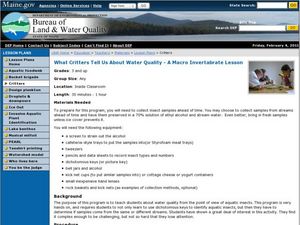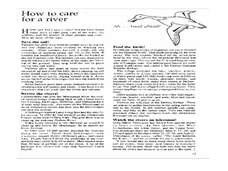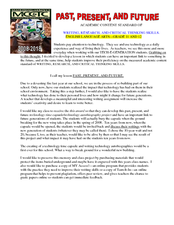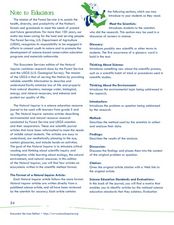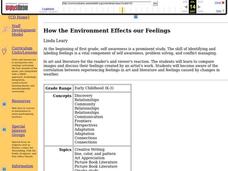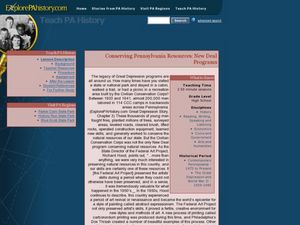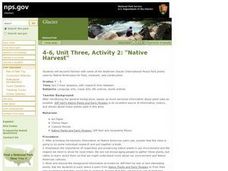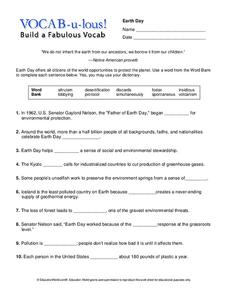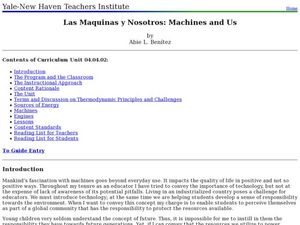Curated OER
How Smart Growth Can Reshape Communities
Middle schoolers explore the concept of smart growth development. They create a class list highlighting the benefits of smart growth and then research, discuss, and present their findings on the benefits of smart growth and how it...
Curated OER
Understanding Biodiversity Via Ecological Footprints
Sixth graders investigate the ways in which human beings impact the environment and ecology through the calculation of their own ecological footprint, discussion questions pertaining to biodiversity and potential imbalance hazards, and...
Curated OER
Animal Electronic I.D.
Students discover ways to keep the animals in our environment safe by examining electronic I.D. tags. For this animal safety lesson, students participate in a role-playing activity in which they are monitored by an electronic I.D....
Curated OER
What Critters Tell Us About Water Quality: A Macroinvertebrate Lesson
Students explore our ecosystem by investigating the quality of our water. In this aquatic insect lesson, students examine a group of random insects collected from different streams and ponds in the area. Students record their...
Curated OER
Save Our Forests
Fifth graders discuss the forest products industry and its affects upon their communities. They inventory the wood and paper products they consume and determine how it translates into the number of trees cut. Using a spreadsheet, they...
Curated OER
Making Paper
Students explore how natural earth materials are processed into a human-made product. They simulate a manufacturing process by making paper. Students review the importance of recycling in preserving our natural earth resources.
Curated OER
Natural Forces
Learners assess the damage natural forces have caused Maryland's geographic features. For this state geography and ecology lesson, students work in a group to research ways in which weathering, erosion, and deposition have affected the...
Curated OER
Rainforest
Young scholars examine how important the rainforest and its resources are for our everyday survival in the future.
K12 Reader
Summarize It: President Theodore Roosevelt's 7th Annual Message to Congress
How did Theodore Roosevelt stress the importance of conservation during his time as president of the United States? Take a closer look at the language Roosevelt used himself in a 1907 address to Congress, and have your young...
Curated OER
The Delicate Balance - Iowa's Natural Resources
Discover the natural resources in Iowa by studying it's history. In this environmental lesson, your young scholars will observe a topographical map of Iowa and identify where its most valuable resources are. They complete an Iowa name...
Curated OER
Past, Present, and Future
Learners explore school history by documenting daily life. In this time capsule lesson, students discuss the impact a fire had on their school during the previous year and identify ways to preserve information about their school by...
Curated OER
Pets: Oh Behave
Students develop an understanding of how innate and learned behaviors and the environment determine behavior. They see how a variety of factors affects our pet's behavior-including species-specific traits, the environment, training, and...
Curated OER
Natural Inquirer Ecosystem Article Lesson
Students discover new ways to preserve the ecosystem by completing graphic organizers. In this environmental lesson, students read an article from the Natural Inquirer in small groups and fill out a graphic organizer based on the...
Curated OER
Recycling
High schoolers discuss the pros and cons of recycling on the environment. They sort and classify objects for recycling and write a brief narrative about the experience. This lesson is intended for students acquiring English.
Curated OER
How the Environment Effects our Feelings
First graders compare images and discuss their feelings created by an artist's work. They explore the correlation between experiencing feelings in art and literature and feelings caused by changes in weather.
Curated OER
Conserving Pennsylvania Resources: New Deal Programs
Young scholars analyze the impact of the New Deal programs in Pennsylvania. For this Great Depression lesson, students examine the New Deal programs and their legacies in Pennsylvania. They relate these programs to the preservation of...
Curated OER
Ecological Impact of Wood Extraction
Students explore their local environment by conducting a class experiment. In this deforestation lesson, students discuss the effects of wood harvesting on forests around the world and research environment related vocabulary terms....
Curated OER
Native Harvest
Young scholars read Native Plants and Early Peoples and explore the plants in Waterton-Glacier International Peace Park and find how the Native Americans used them. In this Native American plant and people lesson...
Curated OER
Vocab-u-lous! Build a Fabulous Vocab
In this vocabulary worksheet, students select the best word choice to complete the sentence. All words correspond to the theme of Earth Day.
One Hen
Making Choices
When choosing what foods to eat, there are a lot of factors to consider. To help make the decision a little easier, young learners work in small groups developing short plays, stories, or advertisements that address the different issues...
Curated OER
Studying Birds in the Field
This is a well-designed science activity which helps learners learn the behavior of different species of birds. Working with partners and in small team, students learn to scientifically observe birds.
Curated OER
Las Maquinas y Nosotros: Machines and Us
Second graders explain the relationship between energy and work. In this technology lesson plan, 2nd graders describe the different uses of machines in their everyday lives. They record observations and data in their science journal.
Curated OER
World Tourism Day
In this World Tourism Day instructional activity, students complete activities such as read the passage, match the phrases, fill in the blanks, choose the correct word, multiple choice fill in, correct the spelling, put text in correct...
Curated OER
Hawaii
Third graders explore how to do research on the Internet. After they have completed looking up information they create a haiku.



